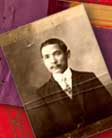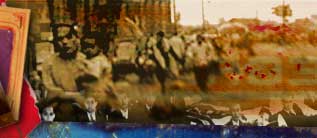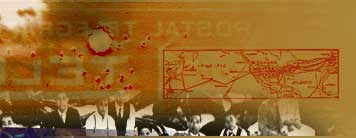Immigration officials were not amused that the former and first provisional president of the Chinese Republic was now traveling with a Japanese passport. That he was no longer viewed with esteem by the government in Peking is evident in a letter found in Dr. Sun’s file. On January 7, 1914, G. L. Harding, correspondent for the London Daily Telegraph, wrote to the Commissioner of Immigration in Washington that he had "been commissioned by Dr. Sun Yat-sen, ex-president of the Republic of China, to submit to you a proposal whereby he and a number of his friends might secure a temporary asylum in the United States." He was making this request because he believed Sun Yat-sen’s life was in danger.
Harding noted that "the time has come in China, as it has often come in European countries, when an enlightened minority standing by the principles of liberty and progress which have made this nation great, are being ruthlessly hunted down and persecuted by the reactionary elements which at present hold the reins of government. Whatever may have been the faults of the determined group of men who planned the Chinese Revolution and founded the Chinese Republic, no one ever so slightly acquainted with the present crisis in China can claim that they or their cause deserve the policy of extermination which is being relentlessly pursued against them."
On January 20, 1914, the secretary of labor received a letter from the Department of State. This letter, also contained in the file, paraphrased a telegram from the American Legation in Peking reporting that Sun was "enroute to Honolulu, bearing a Japanese passport." The Legation requested that some action be taken by the government "either to exclude him from the country or to restrict his political activities if admitted." The secretary was also informed that the Chinese Legation in Washington had been instructed by the Chinese government to lay before the American government the following view:
Sun Wen (Sun Yat-sen) is expected to arrive at Honolulu on the 24th instant or the 25th proximo on his way to the United States under assumed Japanese name and to land at that port on the strength of a Japanese passport. The purpose of Sun Wen’s visit is not to seek refuge in the United States from arrest by china but to incite the Chinese residing in the United States to rebellious attempts with a view to the subversion of the Republic. His case is widely different from that of a political offender. The American Minister has been requested to cable the American Government not to allow him to land.
The case file contains information confirming Sun Yat-sen’s sojourn in Japan during 1914 and 1915. In an interesting letter to President Woodrow Wilson dated September 22, 1915, U.S. citizen Austin P. Brown noted receipt of a letter from Dr. Sun requesting "special passports for one hundred persons to visit the United States and its possessions." He went on to say: "I surely hope there can be no obstacle to granting this small favor and that orders will be quickly issued to our Consuls in China and the United States in order to facilitate the matter."
Mr. Brown, described by INS as "a representative in this country of the Sun Yat-sen faction," received a terse response to his letter from the State Department on September 28, 1915. He was advised as follows: "There is enclosed for your information a copy of the "Treaty, Laws and Rules Governing the Admission of Chinese," containing full particulars for the guidance of Chinese persons of the exempt class who desire to gain entry to this country." In a memorandum to the secretary of labor of October 7, 1915, officials averred: "The Bureau is inclined to think that Mr. Brown should be informed of what the law requires, and that certificates obtained in any other than the statutorily specified manner cannot legally be accepted by immigration officials." As noted in the documents, however, Sun Yat-sen could not obtain the required certificates from the Chinese government because they regarded him and his followers as "mischievous agitators."
The file also provides evidence that the American government was not prepared to grant him even temporary asylum during this period. On October 29, 1915, Secretary of State Robert Lansing wrote to the secretary of labor: "If consent should be given now to the admission of one hundred Chinese, unprovided with the certificates require by law, a precedent would be set which might be embarrassing hereafter to disregard."
The final documents in the file form an ironic epilogue. On May 22, 1925, after the death of Dr. Sun Yat-sen, the American consul general in Canton, China, sent the following message to the secretary of state: "I have the honor to report that I am in receipt of a dispatch from the Civil Governor of Kwangtung Province stating that the Chung Shan Garden Preparatory Committee of Chung Shan District proposes to send three delegates (Chinese) to the United States to solicit funds for the development of a garden in honor of the late Dr. Sun Yat-sen and asking that this Consulate General visa the necessary Section 6 certificates." The consul general requested an "expression of views" regarding this request. On July 21, 1925, the secretary of labor answered: "I have the honor to inform you that, so far as the Department is aware, there are no federal statutes that would prevent aliens, legally admitted to this country, from soliciting funds for legitimate purposes."
So ends the only known INS immigration case file for Sun Yat-sen. However, intriguing possibilities remain that somewhere within the "paper mountain" of INS records, there may rest other case files, perhaps under aliases, that would provide additional insight into Dr. Sun’s other visits. Possibly, another marriage of perseverance and luck will be struck during a moment’s glance at a file name or case number. For now, we are fortunate to have, after all these years, at least one Sun Yat-sen file, protected and preserved for current and future researchers, at the National Archives-Pacific Sierra Region.
NOTES
The author would like to thank the following individuals who helped find the Sun Yat-sen immigration file: Waverly Lowell, Andy Potter, Maureen Auyeung, Charlie Reeves, Him Mark Lai, and Walter Hickey.
As established under the Act of May 6, 1882 (22 Stat. 58), exempted immigrants were required to have certificates issued by the Chinese Government referred to as Section 6 certificates.
Notice to Sun Yat-sen from Inspector in Charge Chinese Bureau, Arrival case file 9995, San Francisco District Office of the Immigration and Naturalization Service, Record Group 85, National Archives-Pacific Sierra Region, San Bruno, California (hereafter cited as INS-SF arrival file 9995, NA-SB).

|





